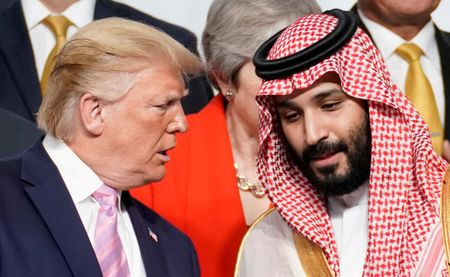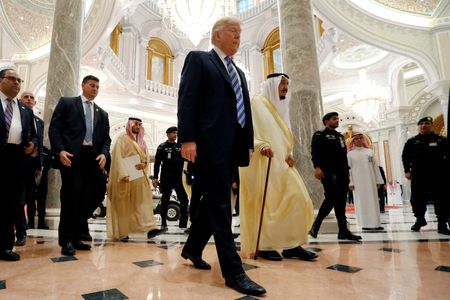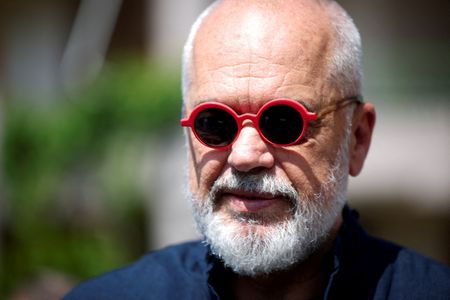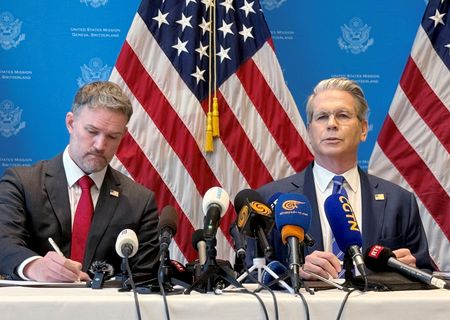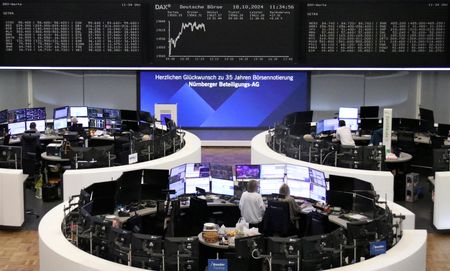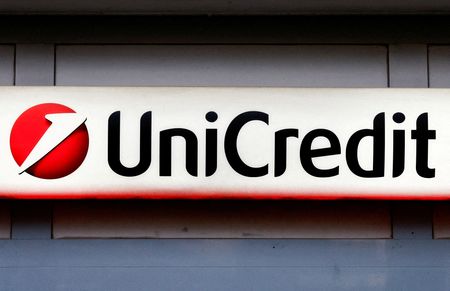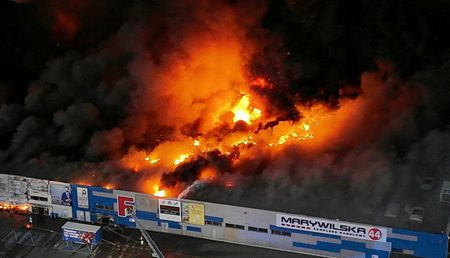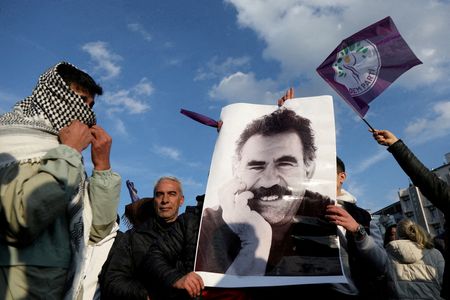(This May 11 story has been refiled to fix a typo in paragraph 1)
WASHINGTON/DUBAI (Reuters) – When U.S. President Donald Trump lands in Riyadh on Tuesday, he will be greeted with opulent ceremonies, gilded palaces and the prospect of $1 trillion in investments. But the raging war in Gaza has denied him one goal he has long craved: Saudi-Israel normalisation.
Behind the scenes, U.S. officials are quietly pressing Israel to agree to an immediate ceasefire in Gaza – one of Saudi Arabia’s preconditions for any re-start of normalization talks, said two Gulf sources close to official circles and a U.S. official.
Trump’s Middle East envoy Steve Witkoff told an audience at the Israeli embassy in Washington this week that he imminently expected progress on expanding the Abraham Accords, a set of deals brokered by Trump in his first term under which Arab states including the UAE, Bahrain, Sudan and Morocco recognised Israel.
“We think we will have some or a lot of announcements very, very shortly, which we hope will yield progress by next year,” Witkoff said in a video of his speech. He is expected to accompany Trump on his visit to the Middle East.
However, opposition by Israeli Prime Minister Benjamin Netanyahu to a permanent stop to the war or to the creation of a Palestinian state make progress on similar talks with Riyadh unlikely, two of the sources said.
Saudi Arabia does not recognize Israel as legitimate, meaning the Middle East’s two most advanced economies and military powers do not have formal diplomatic ties. Supporters of normalising relations say it would bring stability and prosperity to the region, while countering Iran’s influence.
Establishing ties has become especially toxic for Saudi Arabia, the birthplace of Islam, since the start of Israel’s war in Gaza.
As such, the issue, central to bilateral talks in Trump’s first term, has effectively been delinked from economic and other security matters between Washington and the kingdom, according to six other sources Reuters spoke with for this story, including two Saudi and two U.S. officials. The people all asked to remain anonymous to speak about sensitive diplomatic conversations.
Saudi Arabia’s de facto ruler, Crown Prince Mohammed bin Salman, needs the Gaza war to end and a credible path to a Palestinian state “before he re-engages with the issue of normalization,” said Dennis Ross, a former U.S. negotiator.
In the meantime, Washington and Riyadh will focus Trump’s trip largely on the economic partnership and other regional matters, according to the six sources. Lucrative investments such as major deals in arms, mega-projects and artificial intelligence are in play, officials from both sides stressed.
The approach was cemented in diplomatic talks between Saudi and U.S. officials ahead of the trip, the first formal state visit of Trump’s second term, they said.
Trump’s stated aim is to secure a trillion-dollar investment in U.S. companies, building on an initial commitment of $600 billion pledged by the crown prince.
The wealthy kingdom, the world’s top oil exporter, knows the ritual well: dazzle the guest, secure the favor. The goal, the sources told Reuters, is to evade diplomatic landmines and perhaps, one said, to win concessions from Trump on the Gaza war and its aftermath.
“The Trump administration wants this trip to be a big deal. That means lots of splashy deal announcements and collaborations that can be sold as being good for America,” said Robert Mogielnicki, senior resident scholar at the Arab Gulf States Institute, a think tank in Washington.
“Normalizing ties with Israel is a much heavier lift than rolling out the red carpet for President Trump and announcing investment deals,” he said.
A State Department spokesperson declined to comment on any understanding reached ahead of the trip, saying Trump “will look to strengthen ties between the United States and our Arab Gulf partners during the visits.”
The Saudi government communications office did not reply to a request for comment.
COURTING THE KINGDOM
Before Hamas launched its Oct.7 attacks on Israel – killing 1,200 people and sparking the devastating Israeli offensive into Gaza – the crown prince was finalising a landmark diplomatic agreement: a U.S. defense pact in exchange for Riyadh recognising Israel.
But the scale of Israel’s campaign, killing 52,000 people and displacing 1.9 million in Gaza, forced a pause in the talks. Bin Salman accused Israel of genocide.
Frustrated by the impact of Gaza’s prolonged crisis on normalization efforts, Trump could use his visit to unveil a U.S. framework to end the 18-month war, the two Gulf sources said.
The plan could create a transitional government and new security arrangements for post-war Gaza – potentially reshaping regional diplomacy and opening the door to future normalization talks, they said.
Underscoring the high-stakes diplomacy underway, Trump met privately with Israeli Strategic Affairs Minister Ron Dermer on Thursday to discuss the war and nuclear talks with Iran, Axios reported.
The U.S. State Department did not immediately respond to questions about Trump’s discussions on Gaza.
Trump conspicuously has not announced a visit to Israel as part of his tour of the region. Two diplomats noted the U.S. president has recently refrained from talking about his “Gaza Riviera” plan that enraged the Arab world with the suggestion of resettling the entire Gazan population and U.S. ownership of the strip.
In the build up to the trip, Washington has taken a number of actions that are positive for Saudi Arabia. An agreement to stop U.S. bombing of the Houthis in Yemen is in line with a Saudi ceasefire there. Washington has also delinked civil nuclear talks from the normalisation question.
The stalled Saudi-U.S. defense pact, initially conceived as a formal treaty, was revived in the scaled back form of security guarantees late in the Biden presidency to bypass congressional opposition.
The Trump administration has now picked up those talks, along with the discussions about a civilian nuclear agreement, three of the sources said, while cautioning that it will take time to define terms.
CHINA INFLUENCE
Trump’s Saudi trip is his first formal state visit and second foreign trip since his re-election, after attending the pope’s funeral in Rome. He will also visit Qatar and the United Arab Emirates.
Beneath the showmanship of Trump’s visits, diplomats say, lie also a calculated U.S. effort to reassert influence and reshape economic alignments in a region where Beijing – Washington’s chief economic rival – has steadily expanded its foothold at the heart of the petrodollar system.
Trump’s first trip abroad in his first term also began in Riyadh, where he unveiled $350 billion in Saudi investments.
Trump commands deep trust from the Saudi leadership, rooted in the close ties during his first term – a period defined by large arms deals and steadfast U.S. backing for Bin Salman, even as global outrage erupted over the killing of columnist Jamal Khashoggi by Saudi agents in Istanbul.
Saudi Arabia and its Gulf allies now plan to urge Trump to ease U.S. regulations that have increasingly deterred foreign investment, particularly in sectors deemed part of America’s “critical national infrastructure,” five industry sources said.
In meetings with U.S. officials, Saudi ministers will advocate for a more business-friendly climate, especially at a time when China is aggressively courting Gulf capital, the industry sources said.
While countering China’s economic rise may top Trump’s foreign policy agenda, it won’t be easy in Saudi Arabia. Since the launch of Vision 2030, China has become integral to the kingdom’s plans, dominating sectors from energy and infrastructure to renewables.
(Reporting by Samia Nakhoul and Humeyra Pamuk in Washington; additional reporting by Alexander Cornwell in Tel Aviv and Pesha Majed in Riyadh; Writing by Samia Nakhoul; Editing by Frank Jack Daniel)

